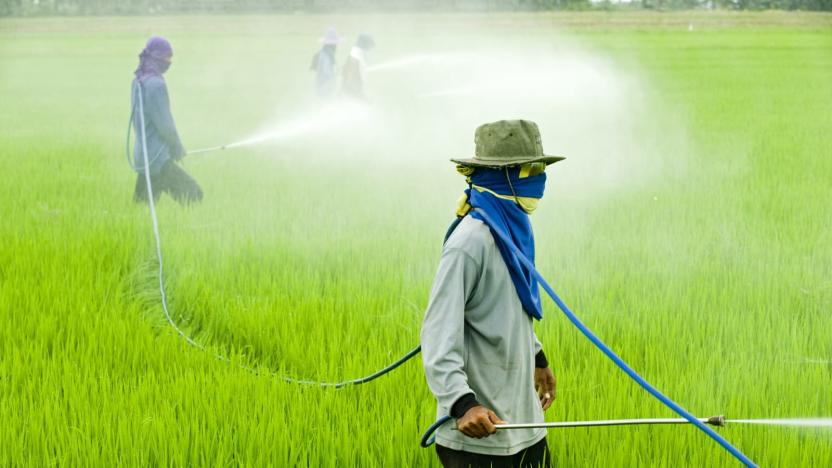farming
Latest

Recommended Reading: Radiohead's 'OK Computer' predicted the future
The Radiohead Prophesies: How 'OK Computer' Predicted the Future Stuart Berman, Pitchfork Pitchfork is celebrating the 20th anniversary of Radiohead's OK Computer this week, including a pretty interesting look at how Thom Yorke imagined the future in 1997. Released at a time when the internet was still a new thing, the album's content ties in directly to 2017. As Berman notes, "OK Computer is really more like the first draft for a never-filmed pilot episode of Black Mirror."

Experiment suggests potatoes really will grow on Mars
It looks like Mark Watney, the fictional, stranded astronaut in The Martian, was right about one thing. Potatoes can grow on Mars. The International Potato Center (CIP) in Lima placed a special potato inside a sealed container that simulates Mars temperature, air pressure, oxygen and carbon dioxide levels. The results so far are positive; cameras inside the canister show sprouts.

Amber's sensors aim to save farmers' grain from spoilage
CES is most known as a show for computers, cars and seriously strange stuff, but there's no shortage of people here trying to solve big problems the rest of us have never heard of. Take Amber Agriculture for instance: Run by students at the University of Illinois, the startup as developed a finger-size sensor meant to be stuck inside silos to help farmers monitor the quality of their stored grain. What's more, Amber's approach falls in line with other big trends at the show. You've heard of the smart home. Now the Amber team is trying to help build the smart farm.

Gnome is a smart garden system for urban horticulturalists
There are quite a few connected gardening products out there to help you grow and nourish plants. But most of them involve smart pots or indoor hydroponic solutions: Perfect for beginners or casual hobbyists, but not so great for more serious gardeners like Hugreen founder Clement Lee. New to the world of organic farming, Lee found himself frustrated by the limitations of existing products like the system from Edyn, which monitors small outdoor areas but is fairly limited in distance and overall capability. Hugreen's Gnome, launching on Indiegogo today, is aimed at large backyards or rooftop gardens and tackles those weaknesses directly with more accurate monitoring and the ability to communicate as far as a kilometer away.

ICYMI: Improving pesticide's sticking abilities
try{document.getElementById("aol-cms-player-1").style.display="none";}catch(e){}Today on In Case You Missed It: MIT researchers created a kind of pesticide that is much more likely to stick on plant leaves because its additives are made of negatively and positively charged polymers that bond together. This means far less pesticide needs to be used for the same effect, and fewer pollutants are likely to get into the water system. If you're interested in watching the full dominoes video (and why wouldn't you be, that stuff is mesmerizing) you can find it here. As always, please share any interesting tech or science videos you find by using the #ICYMI hashtag on Twitter for @mskerryd.

Google AI builds a better cucumber farm
Artificial intelligence technology doesn't just have to solve grand challenges. Sometimes, it can tackle decidedly everyday problems -- like, say, improving a cucumber farm. Makoto Koike has built a cucumber sorter that uses Google's TensorFlow machine learning technology to save his farmer parents a lot of work. The system uses a camera-equipped Raspberry Pi 3 to snap photos of the veggies and send the shots to a small TensorFlow neural network, where they're identified as cucumbers. After that, it sends images to a larger network on a Linux server to classify the cucumbers by attributes like color, shape and size. An Arduino Micro uses that info to control the actual sorting, while a Windows PC trains the neural network with images.

MIT gives pesticides an electric charge to improve stickiness
There are plenty of problems with pesticides -- making bees dumb, anyone? -- but the biggest is probably how much is wasted while it's being sprayed onto crops. Because of how certain leaves naturally repel water, it means that hardly any anti-bug treatments actually, you know, stick to them. In fact, only two percent of the spray stays in place, according to MIT News. So, to change that, a team of researchers have devised a way to increase the amount of liquid a leaf's surface retains.

India is building a monsoon-predicting supercomputer
In India, monsoons are big business. If the country has a healthy rainy season, its agricultural industry thrives and helps account for a fifth of the total value of its goods and services. It's vitally important for meteorologists to predict when those rains will come, so instead of utilizing numerical or statistical predictions -- which once failed to predict India's biggest drought in 40 years in 2009 -- the country is spending $60 million on a supercomputer that could give farmers the advance notice they need to plant crops and increase yields.

Bayer to use satellite imaging to modernize farming efforts
You probably know Bayer for its aspirin. But the multinational pharmaceutical company has its fingers in more pies that that -- it's also keen to become a force in agriculture. As part of a push to focus on its Crop Science division, the company's partnered with Planetary Resources, an aerospace tech company, to create products and services using data obtained from satellite imagery. The goal? To sell services and tools to farmers that will make agriculture more efficient and environmentally adaptable. Though the collaboration has just been announced and, therefore, no services have yet been created, Bayer's indicated a few key areas where satellite data could be beneficial: water conservation through more ideally timed irrigation; recommendations on timing for crop planting; and the ability to determine what soil will hold water best.

DJI's MG-1 drone is water-resistant, dustproof.. and made for farming
DJI's newest drone isn't its sexiest: it's a specialized, toughened agricultural drone. Yep, hard to get excited about unless you're a farmer perhaps, but the Agras MG-1 is dust-proof, water resistant and constructed from anti-corrosive materials. Smart decisions for an agriculture drone, but also ones we wouldn't mind some extra peace of mind in the consumer drones we pilot in the suburbs and cities. (Rain is a real danger, okay?) The MG-1 can even be rinsed clean after a day on ranch. When it comes to crop-spraying, the drone can carry over 10kgs of product -- and DJI pegs it at over 40 times more efficient than manual spraying -- although it uses a watering can to illustrate the comparison...

ICYMI: Farming indoors, realistic robot baby study and more
#fivemin-widget-blogsmith-image-644584{display:none;} .cke_show_borders #fivemin-widget-blogsmith-image-644584, #postcontentcontainer #fivemin-widget-blogsmith-image-644584{width:570px;display:block;} try{document.getElementById("fivemin-widget-blogsmith-image-644584").style.display="none";}catch(e){}Today on In Case You Missed It: University of California San Diego researchers are using the creepiest baby robot you have ever seen (seriously) to compare how human babies get parents to respond with loving facial expressions. Canada is overhauling food production with LED lights, recycled water and conveyor belts in a way that could well be replicated in spaces across the U.S. And in a moment that makes us pause to marvel at technology, Bluetooth connected electrodes were used to help a paraplegic man walk for the first time since being injured.

Fulfill your virtual farming dreams with this $300 tractor controller
At one point or another, most of us have tried (and normally failed) to tackle a few laps in Gran Turismo or Forza Motorsport with a racing wheel. But have you ever used one to drive a tractor in Farming Simulator 15? Nope, didn't think so. Peripheral maker Saitek has designed a new, monster accessory that includes a steering wheel (with turn knob), foot pedals and a side console complete with over 25 programmable buttons and a loader stick. It's designed specifically for Windows and Mac, and the price alone means it'll only appeal to the most hardcore agriculture enthusiasts: the all-in bundle will set you back $299.99, or you can pay $149.99 for just the side panel or wheel/pedal combo.

Albion Online's winter test begins January 26th
Backers of Albion Online have been sitting on their hands for a while now, waiting for the next alpha test of this isometric sandbox. The good news is that Sandbox Interactive has announced that the alpha winter test will begin in a little over a month on January 26th. There will be plenty of new and updated systems to check out during this testing cycle, including an extensive farming system, consumables, more weapons, more skills, and player and guild islands. Another significant change is that players can flag themselves as friendly or hostile in PvP areas, effectively adding consensual PvP into the game. Albion Online's winter test will be available to legendary ($100) and epic ($50) founders and will last for four weeks.

Flameseeker Chronicles: Navigating Guild Wars 2's Tangled Paths release
I was late playing Guild Wars 2's latest update, Tangled Paths, because I was on an airplane when it went live. That might be a better excuse than "the dog ate my homework," but I don't have one for "a dog ate my character," which is exactly what happened as soon as I got home and logged in. Read on for the reason I actually welcome our vicious new dog overlords, as well as why Caithe and I need to have a long talk. You'll also find an exclusive photograph of Bellevue, Washington, taken from the roof of ArenaNet's studio, which is exciting primarily because I got the Seattle skyline in the very same shot without it coming out blurry, even on my awful camera phone. I'm proud of that and nobody can take it from me. As usual, spoiler warnings apply!

Get ready to grow: Albion online adds farming
If you are all thumbs at PvP but have a green thumb in real life, Albion Online has the calling for you: farmer. The upcoming sandbox is adding an agriculture system for players to engage in when not out braving the dangers of the world. On top of a relaxing alternative to combat, farming will provide buffs via foodstuffs and potions made from the bounty of the land. The system is an involved one. Players can grow crops on farms and/or raise livestock on pastures. The farmed produce and grains can then be processed via mills and cooking pots into consumables or fed to the cattle, goats, chickens and more (which in turn produce consumables like eggs, milk, and meat). So grab your overalls and get ready to share some cakes, kabobs, pies, and potions with hungry friends and customers. [Source: Sandbox Interactive press release]

Toshiba joins other tech giants in growing super-clean vegetables
The name "Toshiba" conjures images of stacks of laptops piled high and maybe the occasional television, but the Japanese electronics giant is turning its attention to something just a little more humble: lettuce. Well, spinach too. And swiss chard. Quartz's Dan Frommer tells the tale of a Toshiba-owned clean room nestled in the industrial corners of Yokosuka where people clad in special suits dutifully plant seeds and plop them on tall racks under an array of fluorescent lights. The end result? Tasty veggies that you won't need to wash (though if you're a mild hypochondriac like your author, you'd probably give 'em a quick rinse anyway).

Forget caves, cool kids hang out on Destiny's Loot Stairs
While Destiny's multiple "Loot Caves" lack deeper insight into the game's purpose, they offer a bunch of sweet gear. But who needs caves when you can hang out on steps? Ministry of Geeks guided players through a new loot-producing area in the early parts of the game in a new video, the Loot Stairs.

New Oculus Rift, the Blackberry Passport and other stories you might've missed
It's the weekend, ya'll. So while you sit back and relax, check out our news highlights from the last seven days -- we took the new Oculus Rift for a spin, went hands-on with the Blackberry Passport, made an Ello account, and more. Oh, and be sure to subscribe to our Flipboard magazine!

What you need to know about the robots that feed humanity (updated)
In Iowa, there's a 3,000-acre farm that uses machines to accomplish most tasks, from seeding to fertilizing and chemical application. This land, owned by the Mitchell family, is known as one of the most mechanized farms in the United States, and it's far from being unique. The Mitchells and their equally high-tech neighbors are some of the top corn producers in the US, thanks to their machines. But more and more farmers in the country are also turning to agricultural robots, as laborers start dwindling in number and demands for crops and produce continue to grow. After all, they need all the help they can get to feed millions of people, since it's just not feasible to farm by hand anymore as it was a hundred years ago. Seeing as the US population has grown by 22.5 percent between 1990 (an estimated 250 million) and 2010 (310 million), and the Census Bureau expects it to balloon to more than 420 million in 2050, you can expect to see more robots doing the dirty work on more American farms.

Pumpkin Online hits its funding goal
Starting out with a niche premise of farming and inclusivity, Pumpkin Online was never going to hit record-breaking numbers during its Kickstarter campaign. But fans can rejoice today, as the game met its funding goal with just a bit over 48 hours to go on the overall campaign. That's a far sight from hitting any stretch goals, but it means that development on the game should continue. The Kickstarter page launched with a modest goal of $30,000 in funding; the game is also seeking entrance on Steam Greenlight. If you were fond of the concept but didn't want to toss money in without the safety of a funded campaign, there's still a little more time to throw money into the pot. [Thanks to wolfyseyes for the tip!]

















